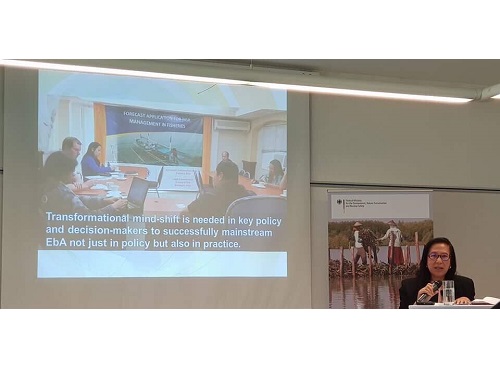
May 07, 2018 Monday

May 7, 2018. The Climate Change Commission (CCC), as represented by Senior Technical Adviser Joyceline A. Goco, highlighted the importance of ecosystem-based adaptation (EbA) in conserving and managing ecosystems to help people adapt to climate change and expressed that a transformational shift in our policy and decisionmakers’ mindset is needed to successfully mainstream EbA, not only in policy but also in practice.
Goco made the statement during her presentation “10 Years of IKI in the Philippines: Bridging Theory, Policy, and Practice of Nature-based Solutions to Adaptation,” at the 10th Anniversary of the International Climate Initiative (IKI) held at the sidelines of the 48th Session of the Subsidiary Bodies of the United Nations Framework Convention on Climate Change (UNFCCC) on May 5 in Bonn, Germany.
“EbA in the Philippines builds from a long history of community-based approaches to natural resources management in the country. The support we received from IKI and other development partners enabled us to mainstream EbA solutions into national policies, development processes, and major climate actions,” Goco said.

Among these policies, processes, and climate actions Goco mentioned included: the National Research and Development Agenda on Climate Change; Results-based Monitoring and Evaluation System of the National Climate Change Action Plan and the Climate Change Expenditure Tagging (CCET); Enhancement of the Comprehensive Land Use Plan (CLUP) Guidebooks; National Climate Change Mitigation Framework Strategy (NCCMFS); and the preparation of the country’s Nationally Determined Contributions (NDC).
Goco noted that the valuation of ecosystem services is instrumental to help “visualize” trade-offs and provide evidence for EbA that is tangible, visible, and relatable. She added that developing tools that address context-specific requirements and building in-country expertise is key to getting political buy-in of EbA both at the national and local levels.
“While climate change projections are available, impact models and assessments are still very limited—except in isolated, pilot cases—which could be addressed by policy and decision-makers through specific interventions and measures,” Goco said.
Goco emphasized that the Department of Environment and Natural Resources (DENR) is a key agency in mainstreaming EbA at the national level. She mentioned that the global learning and knowledge exchange platform facilitated by the IKI-supported EbA Global Community of Practice helped the Department of Environment and Natural Resources (DENR) in articulating their Ecological and Environmental Stability (EES) strategy in the Philippine Development Plan (PDP).
She also noted that, in 2016, the DENR issued a Memorandum Order for bureaus and services, from national to sub-national down to the community level, to integrate EbA in all programs, projects and activities—as an articulation of the department’s contributions to the implementation of the Philippine INDC in relation to the Paris Agreement.
For Goco, while EbA is an acknowledged approach to adaptation to climate change, the Philippines still has a long way to go in bridging the fast-evolving science, policy, and practice.
“The Philippines is well positioned for mainstreaming EbA in theory and policy, but prevailing practice shows otherwise. Measures focusing on resilience building through enhancing capacity of social and ecological systems, policy and governance, and research and development still receive smaller portions of the government budget,” Goco explained.
In closing, Goco expressed appreciation to BMUB IKI’s diverse support in the country, covering policy advisory, capacity development, developing tools and methodologies, and testing solutions at the national and sub-national levels, all of which “enable the country to innovate on the approach for climate-resilient ecosystems and communities in the Philippines.”